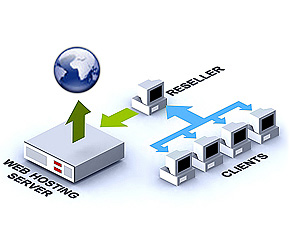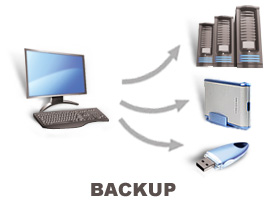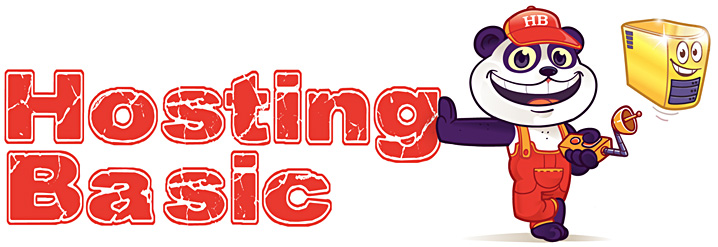Reseller Hosting Meaning
Introduction To Reseller Hosting
Shared Hosting is the most common type of Web Hosting chosen by normal people. For most of the normal sites, shared hosting is more than enough. How about making some extra money through a shared hosting? Sounds interesting? Then read more, as this post provides you all details about it.
What Is Reseller Hosting?
Reseller hosting is a type of Web Hosting, in which you purchase resources from your Web Hosting provider, and resells it to your clients. That way, you get your websites hosted, at the same time makes money by reselling the extra resources. Reselling is the easiest and cheapest means to start a Web Hosting business. Reseller hosting is just an extension to shared hosting. Means, reseller hosting accounts reside in a normal shared server itself, the only advantage is that you get more resources, more power and more features than a normal shared hosting plan.
In an earlier post, we compared shared hosting to living in an apartment where you shared all resources like play ground, parking lot etc with other residents. Reseller hosting also does the same, but here you rent out a big apartment and you live in one portion and rent out the rest of your portion to various other people. That way you pay for the apartment, but at the same time you get rent from all those who are sharing your apartment. In this example, you are the reseller and those who rent out portions of apartment from you are your shared hosting clients.
Who Chooses Reseller Hosting?
Reseller Hosting is chosen by those
- Who want to start Web Hosting business, but do not have enough fund or capital to invest
- Who want an extra income or side business in addition to their normal job
- You are a designer/developer with lot of clients and want to easily host their websites
- You are a software company owner, who needs to create and host various websites for your various projects
Unlimited Reseller Hosting
Just like shared hosting, many providers offer unlimited plans in reseller hosting also. With reseller hosting, the term unlimited is often heard with the number of accounts. Means, a reseller do not have any limits on the number of websites that he can create. In addition, unlimited also comes in the form of disk space, bandwidth etc. However? unlimited plans are not that common? in reseller hosting as in shared hosting, for the fact that it is not very affordable to providers to give a reseller unlimited resources. Again, like in any unlimited plans, there will be hidden limits for Unlimited Reseller Hosting also, which you would need to discuss with your provider before signing up.
Reseller Hosting vs Master Reseller Hosting vs Alpha Reseller Hosting
Some hosting companies provide reseller plans of various types. Normal reseller plans which we discuss here throughout are able to create shared accounts only. There is a type of reseller hosting called Master Reseller Hosting, in which the reseller can create sub reseller accounts as well as shared accounts. The sub reseller accounts will act as normal reseller accounts which can create shared accounts only. Another type of reseller hosting is called Alpha reseller hosting in which the Alpha reseller account can create master reseller acounts. However most alpha reseller servers are tend to be oversold, because they create multiple master reseller accounts, which in turn create multiple reseller accounts which in turn create a number of shared accounts. The total number of accounts in such servers would mostly over run the total number of accounts of normal shared servers. In this post, we will be dealing with normal reseller accounts only.
How To Choose A Reseller Hosting?
Now you know what Reseller Hosting is. The next question is how to choose a good reseller hosting. Unlike other hosting types, there are a lot of factors to consider while choosing a Reseller Hosting. Most of them are basic like other plans, however there are a lot of factors which you would require to provide to your clients, hence you should check all those before signing up. Let us get into it one by one.
Know your needs – For what purpose are you getting a Reseller Hosting? It is important that you identify your requirements and search a provider based on that. If you are looking for a reseller hosting for your web design clients, then probably you need a basic Reseller Hosting only. However if you are planning to get into Reseller Hosting business and if you are serious about it, then you require a lot more features. We will get into details about those later in this post. For normal Reseller Hosting, you need to check the following factors.
- Disk Space – You are renting out space to your clients. For them, they are choosing a shared hosting plan from you as if they were signing up with any reliable provider. They do not know that you are a reseller. Hence, you should make sure that you have chosen a reseller hosting plan with sufficient resources. If your reseller account gets filled, it would affect your clients and they would not be able to upload/modify files.
- Bandwidth – Some websites hosted with you may drive huge traffic, hence you should be cautious while choosing the bandwidth limit. If your bandwidth exceeds the limit allotted then the websites will go offline until you upgrade the limit or your limit resets.
- Number of domains – Reseller plans are mostly limited by the number of domains that can be created. As you get more clients, you can upgrade your plan to meet your needs.
OverSelling – Most providers these days offer their reseller customers a feature called overselling. Overselling is the process by which a reseller is allowed to sell more resources than he actually has. For example, if a reseller has 50G disk space limit, he can sell 10G each to 10 customers in his plans, provided that their combined usage do not exceed the actual 50G. Hence, the resellers can sell more, but the actual usage would be limited to what he has. It would be wise to choose a provider who allows overselling.
Reviews – It is always recommended to choose a reliable provider. Experiences from others would definitely benefit in choosing a good provider. Good reviews are not obtained easily. Hence always read the reviews before choosing or buying any product. For your easiness, we have summed up the reviews of a few hosts which we found are good, in our reviews section. Please take a moment to go through them.
Uptime – Uptime is a significant factor which you need to consider while choosing a Reseller Hosting. Because, for your customers you are the hosting provider, hence you will be answerable for any downtime that may occur. Being a reseller, you would not have full access to the server, hence you will have to always depend on your provider to correct the issues. Hence, lesser the downtime, the more reliable you will be considered. So always choose a provider with good uptime.
Support – As mentioned earlier, your customers will contact you for all support issues, but your access to the server to troubleshoot or correct the problem is very limited. Hence your provider should have an excellent support team on board to help you with the issues, any time round the clock. Before signing up, you should test the support/sales team of the provider if possible. Their response time, attitude towards customers, knowledge level etc should be considered while choosing the provider. Also, try to choose a provider who offers live chat so that it is easier for you to contact them and also get an answer real time.
Backups – Backups are a very crucial aspect of any hosting. Being a reseller, you would not be able to confirm the proper working of backups. Also, any host, even though they would take backups, would not accept the responsibility if something goes wrong. Hence, it is always recommended that you take remote backups of your own, so that in case of any issues you would be able to help your customers, even if the host's backup doesn't work. Also while choosing hosts, try to choose hosts who offer third party backups like R1soft.
proper working of backups. Also, any host, even though they would take backups, would not accept the responsibility if something goes wrong. Hence, it is always recommended that you take remote backups of your own, so that in case of any issues you would be able to help your customers, even if the host's backup doesn't work. Also while choosing hosts, try to choose hosts who offer third party backups like R1soft.
Price – Price is a dominant factor while buying any product. People always tend to choose the cheapest product. Reseller plans are also available at various costs, some even starts at $1 with unlimited hosting. However, cheap doesn't always offer quality of service. When you go after low cost services, you should be ready to compromise on the quality side. Hence, to get a service that is worth the money you spend, we would recommend you choose a good plan based on your requirements from a quality host. Many hosts also run discounts and issue discount coupons for customers. This would help you get a quality product at a reasonable cost. We have gathered the discount coupons of various hosting companies. You can go through the offers provided at our Discount Coupons section, and use that coupon code while signing up with your provider.
Refund – It would be wise to choose a Reseller provider who offers money back guarantee. Because, even after a thorough research, sometimes you might not be happy with the provider you chose. Hence, always sign up for monthly contracts, and if you are not happy with the service you can cancel your account and ask for refund. If you cancel within a period that falls in their money back scheme, then you will not suffer any loss.
Control Panels – Choose a provider who offer a good control panel. cPanel is the most preferred panel in the hosting industry and it is the most recommended too, due to its ease of use. Your customers would definitely require a panel to setup their website, and you would also require one to manage your client domains. So always choose a panel which you are comfortable with. Apart from cPanel, Plesk, Webmin, Centos Web Panel, Interworx etc are also preferred.
Account Migrations – You would have a lot of accounts to migrate or restore. When a client signs up, you would have to restore their websites if they are switching from another host to you. In that case you wouldn't be able to restore the accounts due to your limited access. Hence you need to make sure that your support team would do account migrations on your behalf free of cost.
Location – Location of your provider is a major factor. You need to choose a provider who provides reseller accounts in a location which is near to where you targeted audience is. As your business expands, you can purchase accounts at various locations which would help you display more locations in your website, making people think that you are a big hosting company with multiple locations, which would increase your sales.
How To Start A Hosting Business As Reseller?
As explained above, the first step to starting a Reseller Hosting is to choose a good reseller provider. The factors mentioned above would help you in choosing a good provider. Once you have signed up for a reseller plan, you would have to consider a lot of factors to start the hosting business. Listed below are a few such things that a reseller would require to start his hosting business.
A good business website – The first thing you require is a good website. Your site visitors should feel good browsing your website. The plans that you offer, the services you provide, another special features if any, live chat options, your contact details etc should all be present in the website and they should be able to easily locate these options as well. The website should be done in a professional way and if possible purchase a good hosting theme for the site. If your website is not good, then chances are less for the visitors to stay in the site, and hence the ratio of visitors turning to customers would also be less.
Billing Software – You should have a good billing software incorporated into your website. You can use this software for admin and client purposes. This software helps you automate a lot of things like customers can order products through this, and they would receive a client area login which they can use to further manage all services, buy addons, pay invoices etc. The same software can be used by the reseller to manage all clients, accept orders, send invoices etc. The billing software will automatically do most of these tasks there by reducing the load on resellers. The most commonly used billing software these days is undoubtedly WHMCS, which has a lot of helpful features. WHMCS is licensed, and some reseller providers would provide the license for free with the reseller plan.
Control Panel – As a reseller, you would be providing shared hosting to your customers. A control panel to manage their domain and email accounts are a mandatory requirement. Most reseller providers use cPanel control panel. It is the most commonly used panel as well. Hence, make sure you provide a good control panel to your customers.
End User Support – This is an option which is offered by very few reseller providers only. End User Support means your provider's support team will answer the tickets of your customers as if they were your support team. Normally, the reseller provider will give support to direct resellers only. They will not provide support to reseller's customers. Hence in most cases, when a customer opens a ticket, the reseller will have to copy paste it into his provider's help desk to take care of the issue. When the reseller's support team responds, he will copy paste the response back to his customer. Hence it is an extra effort for the reseller to be available all the time to address his customer's tickets. End User Support eliminates the need for that where by the reseller provider offers an interface where the end customers can open tickets and the support team would immediately work on it and respond back to the customers. This helps the reseller provide 24×7 support to his customers without actually employing a support team for that.
SSL – SSL certificate for the reseller's client area is a must. All transactions are to be transmitted in an encrypted manner and hence the reseller should purchase an SSL certificate and dedicated IP address (if required) for the billing system. Transaction without SSL are considered to be not secure, and most people do not trust such providers, hence make sure you install SSL.
Private Nameservers – Resellers will have the option to set private nameservers, which means even though their accounts are hosted in a shared environments, each reseller can set nameservers of their own and provide those nameservers to their customers. For example, if your reseller account is named abc.com, your provider will give you the option to set ns1.abc.com and ns2.abc.com as your nameservers. All shared clients signing up with you will then use these nameservers. You need to make sure that you register the nameservers with the correct IP Addresses and that you have set the nameservers correctly. This will give you white label nameservers, independent of your host's.
Domain Whois – Most knowledgeable people check the whois record of the reseller website, to get more details about the owner, location etc. You should provide relevant information in the whois record. Some people also check how old the domain is, just to count on the age of the hosting company.
KB Articles – It is a good addon to have a very good knowledbase in your website, to be provided to your customers. If a customer signing up with you, comes across any issues, he can check your knowledge base first for a possible resolution before contacting support. Having a good KB not only helps customers, but also reduces the load on the support team. If possible, it is also good to add video tutorials for a better understanding.
Domain registration – Most hosting companies offer domain registration and it would be a good addon to be added to your website. You can get a reseller account from any domain registrar and integrate it to your website. This will help the customer register the domain through you while signing up.
Backups – You should take care of the backups of your customers. Your provider might take backups, but you have an additional responsibility of taking at least a monthly backup of your websites. If anything happens to your provider's backup server, and if a client requests backup at that time then you should have at least a working backup, though not the latest, to provide to customers. It has happened many a times that though your host would offer backups, many a times you will not get good backups when requested. To avoid such crisis situations, it is advised to have backups of your own.
Terms of Service – Terms of Service or TOS needs to be clearly defined in your website. You need to mention clearly the rules and regulations to be followed by customers while hosting their websites with you. Similarly any special offers that you provide, and the rules, relaxations and exceptions related to it can be defined here.
Abuse Handling – You should clearly furnish in your website how abuse issues would be handled by you. Some customers sign up with a host just with the intention of spamming or phishing or for any other abuse activities. This needs to be taken care of strictly or your provider will suspend your account. So clearly define how such activities will be handled by you, so that customers do not complain later.
Marketing – Once you are all set to start your business, the most important step to be  taken towards getting clients is marketing. Web Hosting is a very competitive field these days, and getting clients is tough. You need to do good marketing to get customers. You can choose social media like facebook, twitter, linkedin etc or use online forums for marketing. Google adwords is another form of advertising your service.
taken towards getting clients is marketing. Web Hosting is a very competitive field these days, and getting clients is tough. You need to do good marketing to get customers. You can choose social media like facebook, twitter, linkedin etc or use online forums for marketing. Google adwords is another form of advertising your service.
Is Reseller Hosting Good Enough To Start A Hosting Business Or Do I Need A Dedicated Or VPS Server?
Well, if you ask me, I would strongly recommend starting a hosting business with Reseller Hosting. Yes, you can start a hosting business with Dedicated and VPS servers as well, but why go for a costlier and difficult option when you have a cheaper and easier option available. Let me explain why.
Reseller Hosting is available at very cheap rates. Most providers allows you to create unlimited domains as well. The restrictions will be imposed in terms of disk usage and bandwidth. Hence, you can create as many small accounts as possible under a basic reseller plan. The amount you spend for your reseller account will be returned from your first few clients itself. After that, any new client addition or any resource upgrade of existing clients adds to your profit. So with a reseller hosting, you start making profits in the first month itself, provided you know how to market your products properly and how to gain clients. Not only that, apart from being cheap, reseller hosting also comes with all features necessary to start a business. There would only be a few addons required in addition, and nowadays many reseller providers give it for free as a part of their offer. Hence, you don't need to spend an extra penny other than the reseller account cost to start with the business.
Now, take the case of starting hosting business with a Dedicated or VPS server. Compared to reseller hosting, both these options are costlier. Even if you use a VPS, you cannot use a basic 512MB VPS for hosting business. You would need to get a VPS or Dedicated Server with good configuration to start with. It will come to many times the cost of Reseller Hosting. The cost doesn't end there. If you are providing a good control panel like cPanel, you would have to purchase the license for it. If you are planning to provide one click installers, which is a mandatory requirement of Shared Hosting, you would need to purchase a license for Softaculous. If you are planning to provide a reliable third party backup, you would need to purchase that too. As such, for each feature you offer, an extra amount gets added to the total cost. Based on this cost, it would take a lot of time to start generating profit from your business, when you use Dedicated or VPS server. The amount you receive would mostly be less than the rent you pay for the server and other addons. Hence, go for a Dedicated Server only if you are patient to wait for profit.
Another reason why I would always prefer a Reseller Hosting is, you don't actually need to know anything about Web
Hosting to start with the business. You are getting everything required with the Reseller plan you purchase. You can simply login to your control panel and start selling by creating accounts. If any issues come, you can seek the help of your support team to correct them. In the case of a Dedicated Server and VPS, that is not the case. You need to setup everything on your own from scratch. You need to install the control panel, configure the software, configure backups, take care of all security aspects of the server etc. You also would need to provide 24×7 support for the customer issues. Unless you get a managed server from your provider, you would be responsible for anything and everything related to the server. A managed server will cost you a lot more than what we described above. Also, the scope of support provided through Managed services also vary from host to host. Hence you cannot expect them to be helpful always. In short, in addition to the huge cost you also need to be very knowledgeable if you run your hosting business in a Dedicated or VPS server.
There are a few negatives also while using Reseller Hosting but compared to the positives, they are nothing. One such downside is that you won't be able to provide anything and everything that your client asks. You would be limited by what your provider gives you. If you have your own server, you can install anything you wish. However that is not a major drawback, because almost all things that a shared account require will be provided by most providers, and the chances for custom requirements are very less. In a nutshell, if you want to get into hosting business and want to earn some quick money, then go for Reseller Hosting. As your business progresses, and when a Dedicated Server is affordable for you, you can switch to a Dedicated Server.
Advantages And Disadvantages Of Reseller Hosting
Advantages :-
- You can start your own hosting at a very cheap cost
- You get clients, and you earn ‘ n ‘ times the amount you need to spend for your reseller hosting plan
- You don't have to be technically competent to start with hosting business. Everything is handled by your major provider.
- You can create domains and manage them all from your admin control panel
- For designers and developers, you don't have to check for hosting for clients at various providers. Instead you can get a reseller account and accommodate all client websites there.
Disadvantages :-
- You reside in a shared environment, and hence any issues caused by any website in the server will affect you and your customers as well
- Your access to the server is limited to your website and your clients' websites. Some reseller providers provide shell access, but that too is restricted.
- Any issues raised by your customers which require command line troubleshooting will have to be escalated to your host's support team and wait for a response from them. You do not have access to server logs to check on the issue.
- If you or your customers require any third party software for the proper functioning of their site, you are not allowed to do it. You do not have root access, and mostly the hosts do not entertain installation of custom scripts in shared servers.
Recommended Reseller Hosts
Based on our reviews posted in the ‘Reviews' section, and based on our personal experiences we have made a list of reseller providers whom we consider reliable. Below is the list of those providers. If interested, you can also check the ‘Discount Coupons' section to find any discount offers from those hosts.
